Physical Address
304 North Cardinal St.
Dorchester Center, MA 02124
Physical Address
304 North Cardinal St.
Dorchester Center, MA 02124
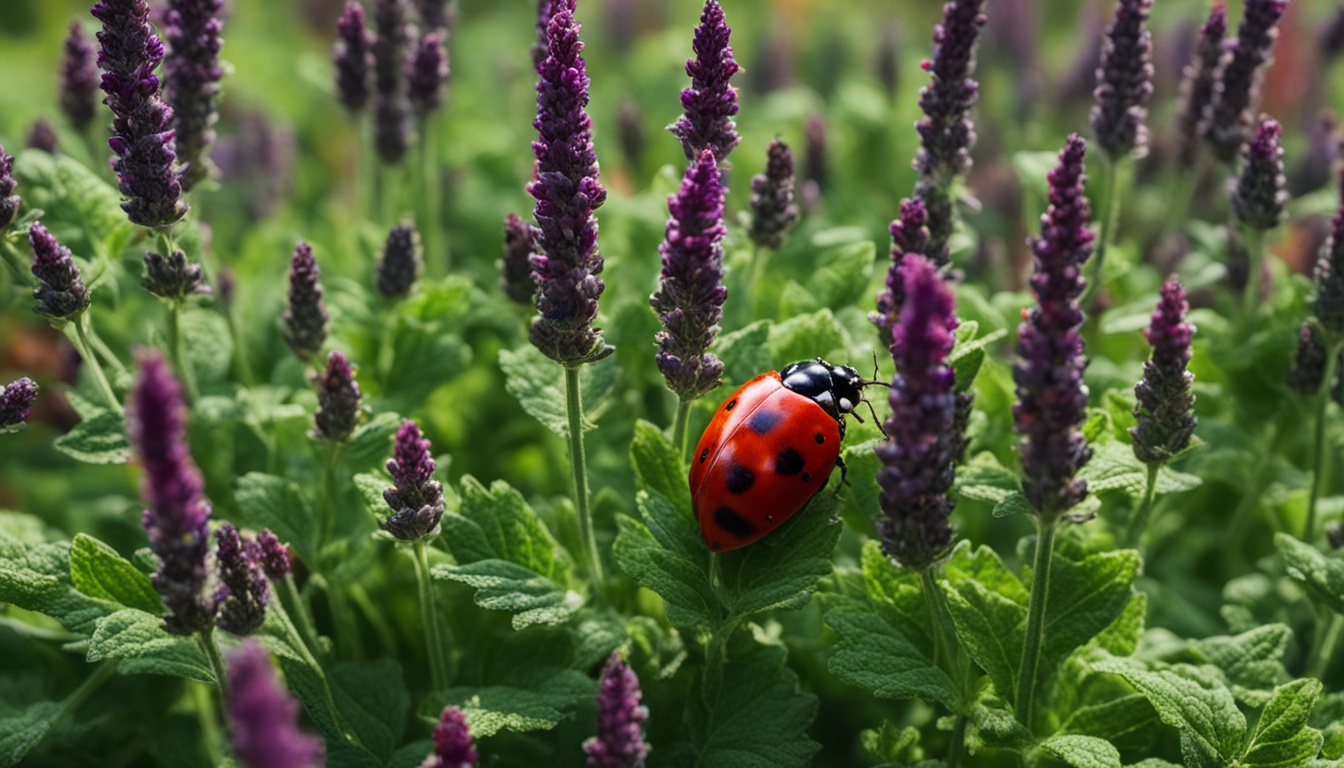
Embrace sustainable gardening with organic pest control methods and nourish your soil for a thriving, eco-friendly garden. Discover natural practices for a healthier environment.
Over the years, I’ve seen how powerful organic pest control and soil health can be. My family had a big garden on our farm. My parents took care of it carefully. They taught me to always respect the soil and nature’s balance.
Today, more than 80% of American homes have gardens. This gives us a chance to grow our own food in a sustainable way. We should use eco-friendly techniques, focusing on organic pest control and healthy soil. This way, our gardens can be healthy for us and the planet.
This article will show you how to keep your garden free from pests using natural methods that are safe. You’ll discover ways to care for your plants, family, and the world without harsh chemicals. By the end, you’ll know how to have a sustainable, healthy garden.
The wide use of pesticides in farming raises big worries about our health and nature. A study showed that 90% of people had pesticide byproducts in their urine. This probably comes from eating fruits and veggies that had these chemicals on them.
Pesticides can stay in our bodies. They might cause a lot of health problems, especially for farmers and their families. These people handle pesticides a lot.
Pesticides have led to fewer honeybee colonies. The use of neonicotinoid pesticides is linked to a 33% drop in hives. This was reported by U.S. beekeepers in two years.
Pesticides harm more than just ‘bad bugs.’ They also kill helpful insects like bees and butterflies. These insects are vital for a healthy environment and farming that can keep going.
Farm workers and their families face a lot of risks from pesticides. They might see genetic changes, and have a higher risk of cancer, allergies, and asthma. This shows we need to find better ways to garden and deal with pests to keep agriculture workers safe.
The author’s journey from conventional to organic gardening is inspiring. They used to use non-organic pest control. Their kids joked they had to “wash the poison off” the food. But, after learning about the dangers of chemicals, they switched to organic ways.
Now, the author grows safe, nutritious food using compost and mulch. They don’t use synthetic pesticides. This change gives their family healthy food and shows the value of sustainable gardening.
Moving to organic gardening takes about three years to see real changes. Despite the wait, the rewards are great. With a focus on organic pest control and soil health, the garden becomes self-sustaining. This means less need for pest control over time.
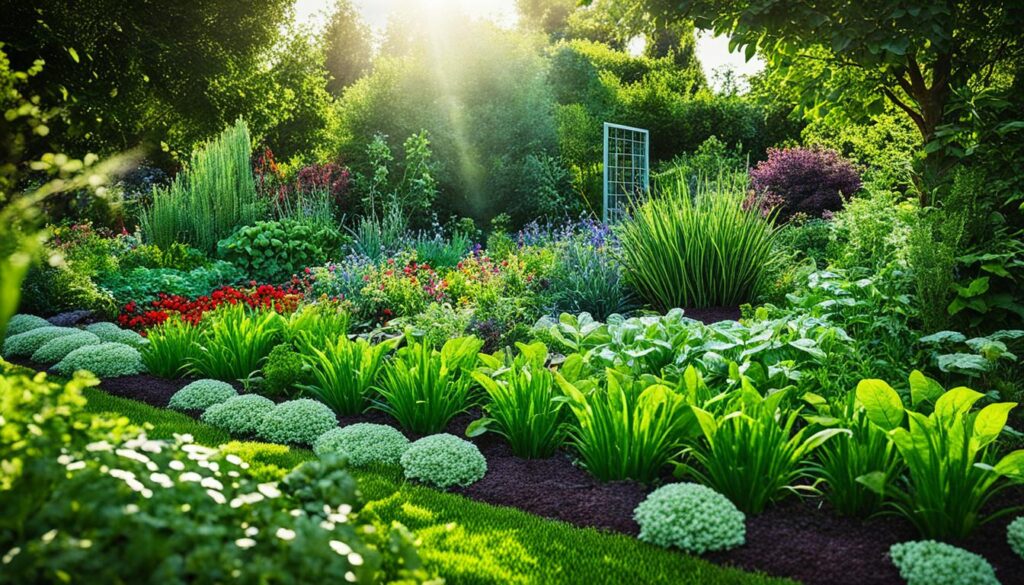
For a successful and green garden, starting early is vital. The second source gives tips on how to prevent and manage pests naturally. Gardening in a way that strengthens plants and breaks pest life cycles can lead to fewer pests.
To fight off pests, strong soil is a must. Add compost, mulch, and organic matter to feed your plants and the good bugs in the soil. This makes plants healthy and strong against pests.
Companion planting places some plants next to others to keep pests away and soil healthy. Using permaculture techniques, gardeners find which plants help each other grow well. Together, they achieve a pest-free garden.
Mixing up where you plant helps break the cycle of pests. Different plants in different places each year confuse pests. This integrated pest management makes your garden an unwelcome place for pests.
Keeping your garden clean stops pests from moving in. Remove old leaves and trash to avoid bugs’ breeding grounds. Regular checks on plants catch pests early, stopping their spread.
Inviting helpful bugs like ladybugs and hoverflies is smart pest control. Planting nectar-rich plants gives them food, while good gardens provide homes. These bugs eat pesky insects, naturally protecting your plants.
With these steps, your garden can thrive with fewer pests around. This sustainable horticulture keeps your garden strong and healthy, naturally deterring pests over the years.
Effective organic pest control starts with knowing the foes in your garden. The importance of checking plants, especially under the leaves, can’t be overstated. Look for eggs, visible pests, or damage signs to spot pest activity early.
This scanning phase helps you to customize your pest management approach. This is vital for Integrated Pest Management to work well in your garden. Knowing what pests to expect sets you on the right path.
The author includes a useful chart in the discussion. It lists garden pests, the harm they cause, and how to spot them. From small insects like aphids to bigger threats such as rabbits and deer, this guide is thorough.
With this guide, gardeners can act correctly. It allows for using suitable Organic Pest Control and Soil Health methods against specific pests. This is a powerful tool for maintaining a healthy garden.
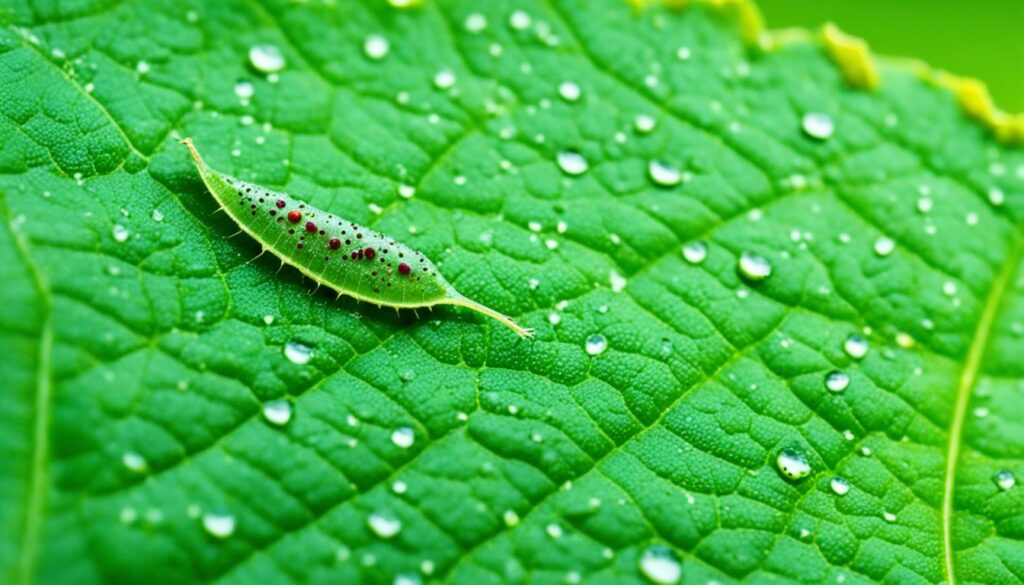
Gardeners are moving towards eco-friendly practices more and more. They’re using organic methods to keep pests at bay without harming the environment. This not only protects our plants but ensures the earth and people around them stay healthy. By using a mix of tricks, they’re making gardens that are full of life.
Food-grade diatomaceous earth is a go-to for many. It’s made from tiny bits of sea creatures. Its sharp edges kill bugs by drying them out. It works wonders on bugs like slugs, ants, and more.
Neem oil is another favorite. It comes from neem tree seeds. This oil keeps bugs away and will kill them. It’s great against many pests like aphids and mites.
Borax is a good choice for ant problems. Mix it with sugar or honey. It messes up the ants’ food digestion. They’ll eventually go away.
Dealing with slugs and snails? Sluggo might help. It stops their food digestion, making them stop eating. Then, they die off.
Beer traps offer a hands-off way to tackle slugs. The smell of the beer pulls them in. They end up drowning in it.
Ducks are an interesting pest control option. They love eating slugs and snails. This keeps the cycle of garden life in balance.
Copper tape stops slugs and snails from getting to your plants. It messes with their slime production. This keeps them away from places you don’t want them.
There are many traps for different pests. Wasp traps, fly traps, and even apple maggot traps. They help control the bugs without harmful chemicals.
Using these many organic methods, gardeners are creating safe and rich gardens. These gardens are full of life and don’t need dangerous chemicals. They are good for the earth, plants, and the people who love the garden.
This section talks about the importance of green gardening practices. It focuses on organic pest control and soil health. The key idea is that by fixing your soil, you make your plants strong against pests. This way, you can have a garden that’s healthy and good for the planet over time.
Gardeners should start by preventing problems without chemicals. How? Use plants that fight off diseases and pests. Try planting different types of plants together and attract helpful bugs. This makes your garden a place where nature helps itself stay healthy.
The secret is in the soil. Using organic compost and mulch helps a lot. It can even make you need up to 80% less pesticides and fertilizers. Take care of the soil, and it will take care of your plants. It’s a win-win situation for you and the environment.
To really make a difference, think about sustainable ways in all your gardening. This means doing things that keep on working without hurting the environment. It’s not just good for your garden but for the whole area around you. For example, it can help streams and salmon stay healthy too.
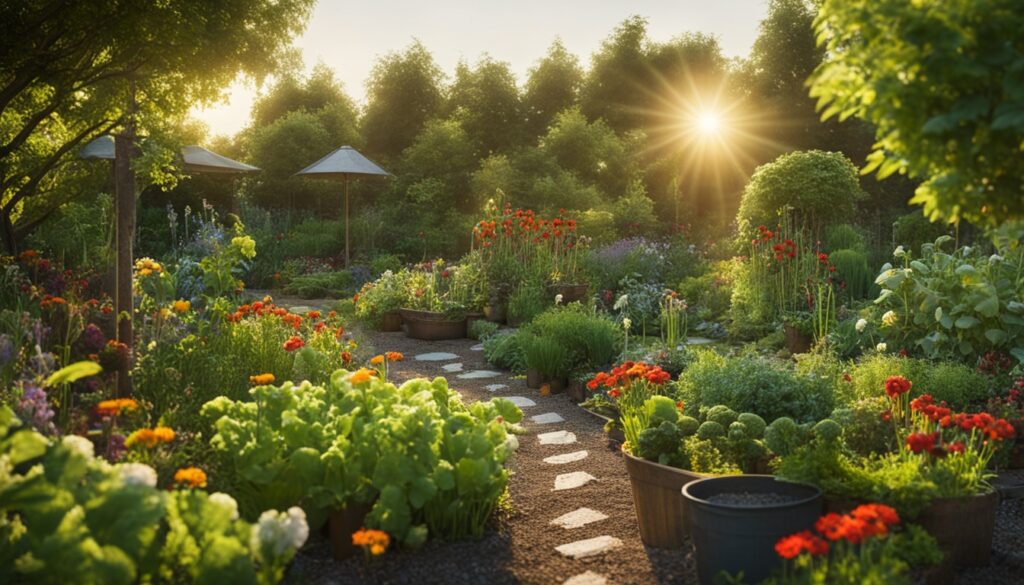
These green gardening practices lead to a garden that’s alive and thriving. It needs less poison, welcomes useful insects, and keeps the soil strong. The advice here is about a way of gardening that’s good for everything around it. It’s about making a garden that helps the planet heal and grow.
Organic gardeners face a tough challenge with cabbage moth worms. These pests love eating plants like broccoli, kale, and cabbage. Managing them is key for a healthy garden.
Cabbage worms, the larvae of cabbage moths, eat a lot. They’re the white butterflies you see around. Their caterpillars can quickly destroy your plants. Knowing how to spot their eggs and caterpillars is important. This knowledge helps you attack the problem early.
There are eco-friendly ways to fight these pests. You can pick them off by hand. Or, you might use covers to keep butterflies away. Adding certain insects to your garden can also help. It’s all about having a plan.
If you want more tips on beating cabbage moth worms, check out our detailed guide. Learning about their habits can save your garden. With the right knowledge, you can protect your plants naturally.
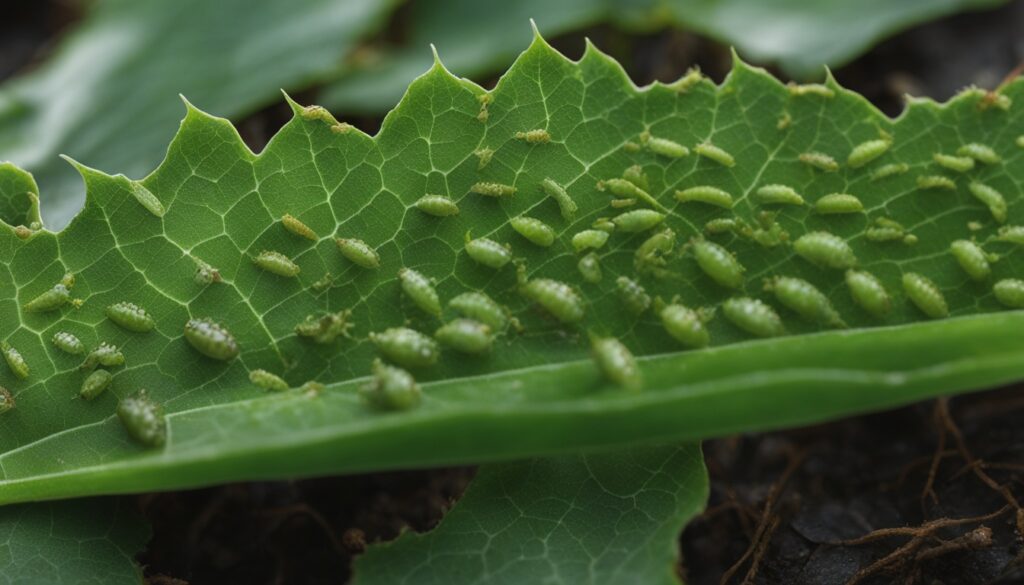
The heart of organic pest control and sustainable horticulture is healthy soil. Organic soil amendments like compost and mulch play a vital role. They help create a strong, biologically diverse garden.
Using compost and mulch in your garden offers many rewards. These organic tools boost nutrient cycling, keep moisture in the soil, and fight off weeds and garden pests. This method supports pest-resistant plant growth, promoting a healthy ecosystem.
It’s key to focus on feeding the soil to benefit your plants. By nurturing a vibrant soil biome, gardeners ensure their plants get what they need to grow. This Compost and Mulching strategy is crucial for a successful organic, sustainable garden.
| Organic Farming Practices | Conventional Farming Practices |
|---|---|
| Average organic matter content: 8.33% | Average organic matter content: 7.37% |
| Higher populations of beneficial soil organisms | Lower populations of beneficial soil organisms |
| Greater nitrogen-fixing nodules in soybean plants | Fewer nitrogen-fixing nodules in soybean plants |
| Higher levels of sequestered carbon | Lower levels of sequestered carbon |
| Reduced nitrous oxide (N2O) emissions | Higher nitrous oxide (N2O) emissions |
The table shows big differences between organic and conventional farming methods. Focusing on Compost and Mulching helps organic gardens grow. It leads to a healthier, biologically active soil supporting Eco-friendly Gardening.
Creating a healthy garden for the long run means using various organic pest control and soil health techniques. These include steps to prevent pests, making your garden eco-friendly. This approach helps cut down on pests naturally and supports the garden’s health over time.
One way to begin is by growing robust plants with Integrated Pest Management (IPM). This means knowing your pests, watching their numbers, and then acting when needed. Using companion planting and luring beneficial insects can keep pest numbers low by natural means.
Adding on are specific organic pest control methods like neem oil, diatomaceous earth, or Sluggo for peskier problems. These biological pest management methods are friendly to the garden’s health. They target pests without harming the overall ecosystem.
Switching to organic gardening might take a while to get used to, but it’s rewarding. Over time, there’s less need to worry about pests, your soil is rich, and you’re left with nutrient-dense, pesticide-free foods. With this mix of permaculture techniques and regenerative agriculture, your garden will be a sustainable oasis for years.
Embracing a sustainable gardening mindset is key for long-term success. It’s about following organic pest control and soil health. This helps create a strong ecosystem that benefits both the Earth and us.
Understanding Biological Pest Management and Permaculture Techniques is crucial. It combines with Compost and Mulching to form strong Regenerative Agriculture practices. These methods work with nature to protect plants.
The important thing is to garden sustainably, not just to fix problems quickly. This way, you can keep learning and adjusting. This Regenerative Agriculture approach helps your garden thrive. It benefits the environment and your happiness too.
Choosing a sustainable gardening mindset is about the future. It’s about feeling linked to the Earth and caring for its balance. This full approach brings about real success and joy in gardening.
This journey through green gardening has shown us something vital. It’s clear that using organic pest control and caring for soil health are crucial. They help create a lively, eco-friendly garden. By taking steps like growing robust plants, putting certain plants together, and bringing in good bugs, gardeners can make a garden that takes care of itself.
The rewards of this holistic approach to integrated pest management are big. It cuts down on harmful chemicals, gives us healthier food, helps the planet, and makes us feel closer to nature. Using things like compost and mulch makes the soil full of nutrients and life. This means fewer pests and stronger plants.
As you keep up your work in regenerative agriculture and permaculture techniques, think about always learning and adjusting. Stay up to date on the best ways to garden organically. Keep a close eye on your garden. Change your approach when necessary. This way, you can have a flourishing, eco-friendly oasis. It will be good for nature and your family. Start on this fulfilling journey in sustainable horticulture. See your garden come alive with the beauty of nature.